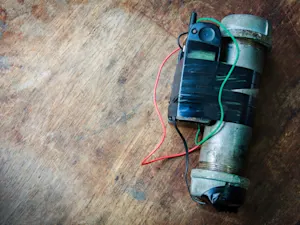
Jay Shetty's No-Scroll Trick Is Simpler Than You Think
Jay Shetty Headshot 2021. Photo by Steven Erle under CC BY-SA 4.0.
What if the secret to breaking your phone addiction isn't about willpower or fancy tech — but a change in mindset that takes you back to the '90s?
Jay Shetty, the best-selling author and podcast host known for his wisdom on purpose and mindfulness, has a surprisingly analog approach to digital discipline. His idea? Treat your phone like a landline — and your brain might just thank you.
'Leave Your Phone in the Other Room' — The Old-School Rule That Works
Shetty's most powerful screen-time strategy starts with a visual: imagine your phone as that clunky rotary dial on the kitchen wall. You didn't bring it into bed. You didn't scroll it on the toilet. You went to it when you needed it — and left it when you didn't.
Shetty takes this literally. He keeps his phone out of reach during work hours, forcing himself to get up and walk to it if he wants to use it. "I found that if you sit down with your phone, you're in trouble. We can treat our phones like landlines if we're slightly more disciplined," he told RealSimple.
That friction — having to move — interrupts the trance of mindless scrolling and brings awareness back to the moment. Shetty also suggests starting your day without a screen. No emails, texts, or headlines for the first 10 minutes. In RealSimple, he said, "You would never wake up and let 100 people into your bedroom before you showered, brushed your teeth, and put on makeup. But when you look at your phone first thing in the morning, you're letting 100 people into your mind. You're letting your boss say, 'This is late.' Your mom gets to say, 'When are you getting married?' The news is telling about another disaster. Just give your brain 10 minutes to wake up."
How the 'Emergency Phone' Strategy Saves Sanity
Shetty knows some people — parents, caretakers, doctors — need to be reachable. That's why he recommends keeping an emergency-only phone with no apps. Think of it as your digital fire escape: there if you need it, invisible otherwise.
For everyone else, the rule is simpler: no screens until your body's awake and your mind is present. The science backs him up. According to Shetty's blog, studies show that early-morning screen exposure spikes dopamine — the brain's reward hormone — making it harder to focus throughout the day and more likely to fuel anxiety.
More Real-World Tips to Break the Scroll Habit
If you're not ready to go full landline, here are some grounded steps you can take:
- Designate No-Phone Zones: Bedrooms, dinner tables, and bathrooms are great places to start. Print signs. Make it official.
- Set Tech Curfews: Put your phone away an hour before bed. Research shows that backlit screens before sleep can disrupt your circadian rhythm and worsen sleep quality.
- Use Background Cues: Shetty recommends setting your lock screen to say something like "Why now?" Every unlock becomes a mindful choice.
- Reclaim Boredom: Waiting for an elevator? Don't scroll. Look around. Make eye contact. Let your brain breathe.
- Try the Phone Bowl: At meals or social gatherings, have everyone drop their phones in a shared bowl. First person to grab theirs does the dishes.
And yes — it might feel uncomfortable at first. Like any detox, there are withdrawal symptoms. But just like those old landlines, it might just bring some clarity back into focus.
Final Thought: You're Not Weak. The Apps Are Just That Strong.
Jay Shetty doesn't blame people for their screen habits. He blames the system designed to make us crave constant hits of validation and comparison.
That's why his advice isn't about guilt — it's about grounding. His methods are gentle, even nostalgic. They remind us that life happens in the room you're in — not the one inside your screen.
Want peace? Start by putting the phone down.
References: Spend Less Time on Your Phone With Jay Shetty's Genius Trick | Jay Shetty ON 6-Step Plan to Block Social Media Influence | 8 Tips to Reduce Screen Time for Adults























